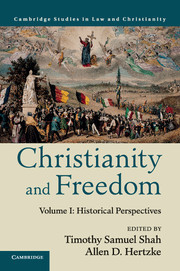Description
Christianity and Freedom: Volume 1, Historical Perspectives
Law and Christianity Series
Coordinators: Shah Timothy Samuel, Hertzke Allen D.
Leading historians uncover the unappreciated role of Christianity in the development of freedoms from antiquity through today.
Language: English
Subject for Christianity and Freedom: Volume 1, Historical Perspectives:
Christianity and Freedom: Volume 1, Historical Perspectives
Publication date: 12-2016
Support: Print on demand
Publication date: 12-2016
Support: Print on demand
Christianity and Freedom: Volume 1, Historical Perspectives
Publication date: 04-2016
426 p. · 15.7x23.4 cm · Hardback
Publication date: 04-2016
426 p. · 15.7x23.4 cm · Hardback
Description
/li>Contents
/li>Biography
/li>
In Volume 1 of Christianity and Freedom, leading historians uncover the unappreciated role of Christianity in the development of basic human rights and freedoms from antiquity through today. These include radical notions of dignity and equality, religious freedom, liberty of conscience, limited government, consent of the governed, economic liberty, autonomous civil society, and church-state separation, as well as more recent advances in democracy, human rights, and human development. Acknowledging that the record is mixed, scholars document how the seeds of freedom in Christianity antedate and ultimately undermine later Christian justifications and practices of persecution. Drawing from history, political science, and sociology, this volume will become a standard reference work for historians, political scientists, theologians, students, journalists, business leaders, opinion shapers, and policymakers.
Introduction. Christianity and freedom: ancient roots and historical innovations Timothy Samuel Shah; 1. God and freedom: biblical roots of the Western idea of liberty Rémi Brague; 2. Theological and secular arguments for religious freedom in early Christian thought Timothy Samuel Shah; 3. The Christian roots of religious freedom Robert Louis Wilken; 4. Lactantius on religious liberty and his influence on Constantine Elizabeth DePalma Digeser; 5. Augustine and religious freedom John Rist; 6. Christianity and the roots of human dignity in late antiquity Kyle Harper; 7. Liberty of conscience and freedom of religion in the medieval canonists and theologians Ian Christopher Levy; 8. Faith, liberty, and the defense of the poor: Bishop Las Casas in the history of human rights David M. Lantigua; 9. Calvinist contributions to freedom in early modern Europe John Witte, Jr; 10. Constitutional protection of the freedom of conscience in colonial America: the Rhode Island and Pennsylvania experiments David Little; 11. Christianity and freedom in the American founding Matthew J. Franck; 12. Vibrant Christian pluralism and the evolution and defense of religious liberty in America Judge Kenneth Winston Starr; 13. Orthodox Christian contributions to freedom: historical foundations, contemporary problematics Elizabeth H. Prodromou; 14. Christianity: a straggler on the road to liberty? Daniel Philpott; 15. Protestant missionaries and the centrality of conversion attempts for the spread of education, printing, colonial reform, and political democracy Robert D. Woodberry.
Timothy Samuel Shah is associate director of the Religious Freedom Project at the Berkley Center for Religion, Peace and World Affairs and Associate Professor of the Practice of Religion and Global Politics at Georgetown University, Washington DC. He is the author, most recently, of Religious Freedom: Why Now?: Defending an Embattled Human Right and God's Century: Resurgent Religion and Global Politics (with Monica Duffy Toft and Daniel Philpott).
Allen D. Hertzke is an internationally recognized scholar of religion and politics. He is author of Freeing God's Children: The Unlikely Alliance for Global Human Rights and editor of The Future of Religious Freedom. A past fellow for the Pew Research Center, he directed the study, 'Lobbying for the Faithful: Religious Advocacy Groups in Washington DC'. He is a member of the Pontifical Academy of Social Sciences.
Allen D. Hertzke is an internationally recognized scholar of religion and politics. He is author of Freeing God's Children: The Unlikely Alliance for Global Human Rights and editor of The Future of Religious Freedom. A past fellow for the Pew Research Center, he directed the study, 'Lobbying for the Faithful: Religious Advocacy Groups in Washington DC'. He is a member of the Pontifical Academy of Social Sciences.
© 2024 LAVOISIER S.A.S.
These books may interest you

Equality, Freedom, and Religion 71.35 €



